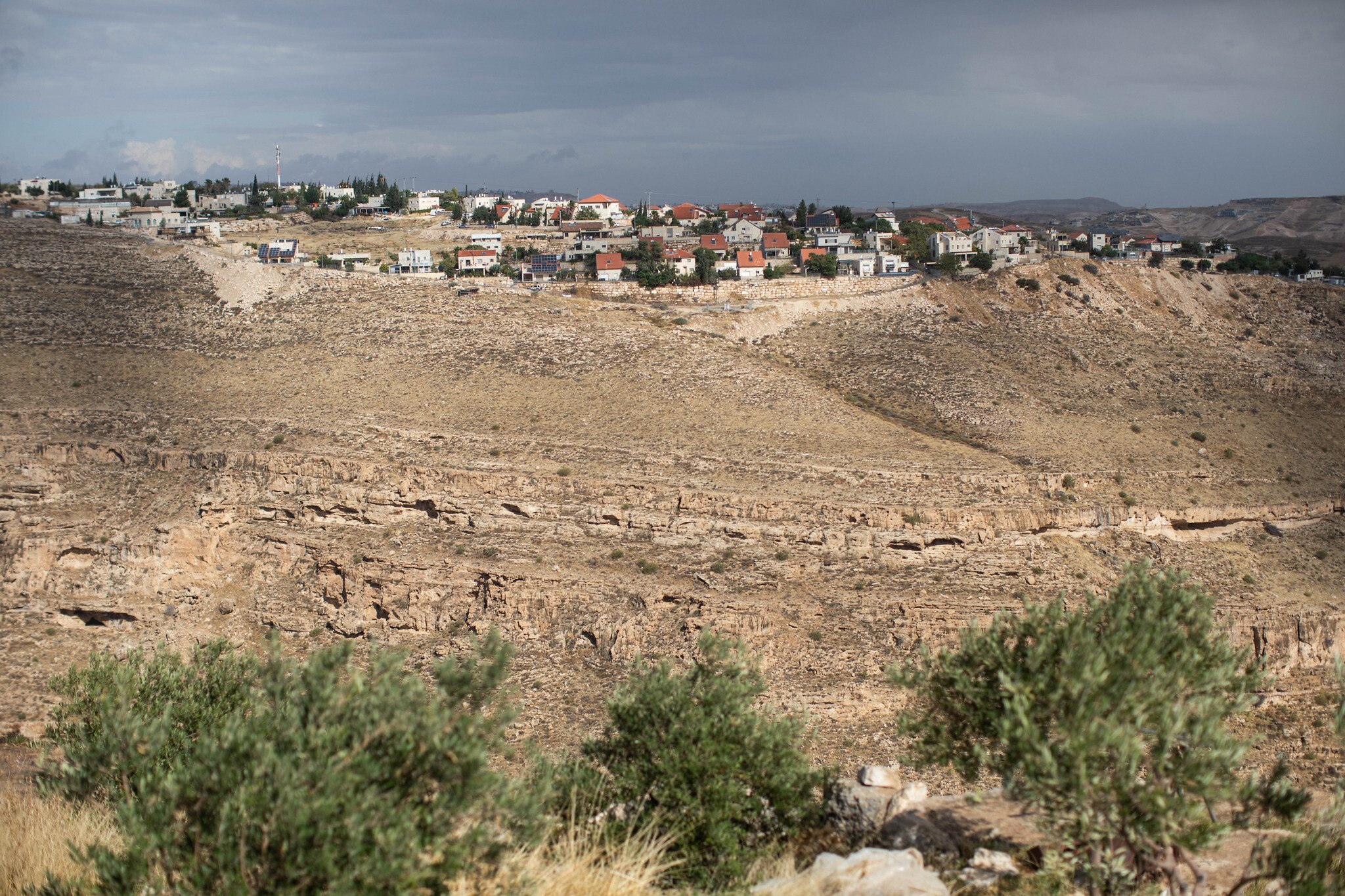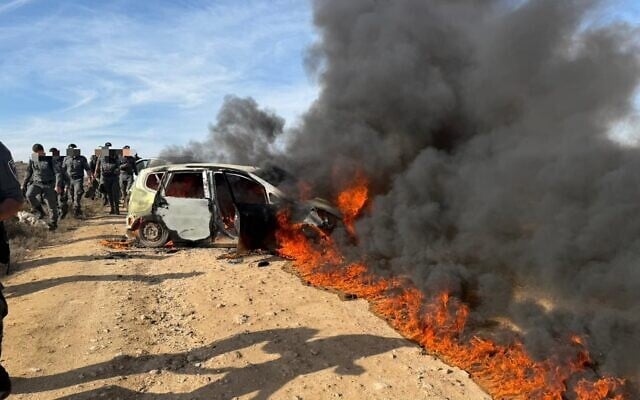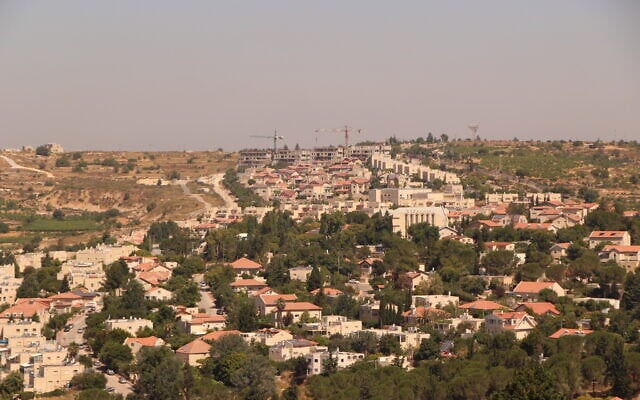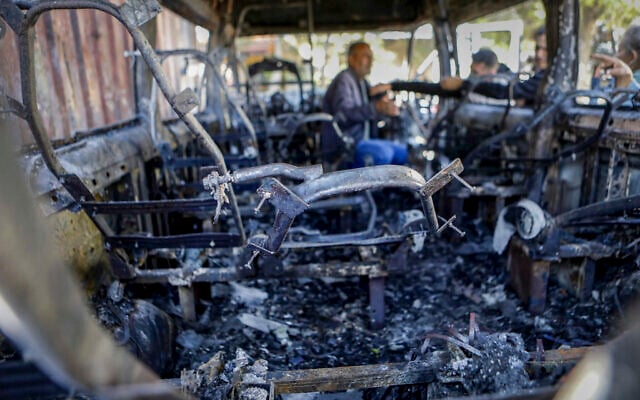‘We cannot remain silent’: 400 Gush Etzion residents sign petition against settler violence

Over 400 people who live in the West Bank settlement bloc of Gush Etzion have signed a petition condemning violent attacks against Palestinian property and residents at the hands of Israeli civilians, one of its initiators told The Times of Israel on Sunday.
The appeal, disseminated last week, addressed local religious and political leaders, calling on them to speak up against the violence. The beginning of the petition quotes a verse from the Torah warning the Jewish people to behave in such a way “that the land not spew you out.”
“We, residents of Gush Etzion, lovers of Zion and the Land of Israel, feel that we cannot remain silent in the face of the terrible wave of violence in recent weeks — horrific acts such as houses set on fire, vehicles burned, property and flocks destroyed, shooting, physical assaults carried out against Arabs residing in the Gush Etzion bloc, with the intent of harming children, women, and men,” the petition reads. “These acts stand in violation of the law, morality, and halakha [Jewish law].”
Rabbi Shaul Judelman, 46, a resident of the local settlement of Tekoa, said the petition has been circulating at the initiative of a group of about 40 Gush Etzion residents who have been organizing to oppose extremist violence for over a year.
“Since the war began, we have been hearing of attacks by extremist youth, mostly against Palestinians in the area, that went beyond any pale of justification,” Judelman, who has lived in the Gush Etzion area since he moved to Israel from the United States in 2000, told The Times of Israel in a phone interview.
“It wasn’t people defending themselves. It was people going out and burning houses or killing sheep. And [we had] a sense that this sometimes is happening around our communities and we have a responsibility to address it.”
The IDF has recorded over 752 incidents of nationalistic crime and settler violence since the start of the year. The total for 2024 was 675 incidents.
“After October 7, the sense that what happened in the Gaza border communities could happen anywhere has been very raw,” Judelman said, referring to the 2023 Hamas-led onslaught in southern Israel.
“Many of the people in our group are in the reserves, guarding our towns, serving in Gaza,” he said. “But at the same time, there’s a question of where the red line is, how we defend ourselves, and what actions we see not as defending ourselves, but actually weakening ourselves, at least in front of God, and I think also morally, in [terms of] what it means to live here.”
Judelman noted that the group, as well as the petition, chose to focus not on the West Bank as a whole but specifically on Gush Etzion because they are familiar with the reality on the ground. (A similar petition has since begun circulating in the Kfar Adumim settlement in the central West Bank.)
“Maybe we do not always know for certain what the facts are in other places, but in Gush Etzion, there are many Jews and Palestinians who have known each other for a long time, and there are connections,” he said.

These connections have at times enabled Judelman and other Israeli residents to help Palestinian victims of violence. He mentioned a case where some cars were destroyed at a garage in the Palestinian town of Jab’a, at a business that is also popular among Israeli clients due to its affordability and the owner’s reputation.
“The owner, Muhammad, volunteers with an Israeli non-profit that helps people stuck on the road,” Judelman said. “One of the cars belonged to an Israeli who had just finished serving in Gaza.”
A drop in the bucket?
The 400 who signed the petition are a small fraction of the close to 30,000 total Israelis who live in the Gush Etzion settlements, and one signatory said the issue of settler violence is a fraught one in the bloc.

Nechama Goldman Barash, an educator at several advanced Jewish studies institutions who has lived in the settlement of Elazar for 29 years, said raising these topics locally has not been easy.
“In my community in Elazar, I feel people don’t want to talk about it,” she told The Times of Israel in a phone interview. “I think anyone I would talk to would say, ‘Of course, we condemn violence, but they are always attacking us, or it’s not as bad as you think’.”
Goldman Barash said she recently joined the activist group working to raise awareness about the violence and has signed the petition. But she has felt nervous about sharing it with her contacts, fearing backlash.
“I still haven’t really put it out on WhatsApp groups in my community,” she said. “I went to Facebook instead, because people are very hostile to admitting that we have this problem.”
She continued, “The narrative is that the Palestinians are violent, and we only respond when we’re attacked, and so the idea that there might be Jewish settlers who do these terrible acts unprovoked is very difficult. In addition, sometimes people think it’s just a small group and they don’t really matter.”

Goldman Barash said that even if the perpetrators are small in number, it is still essential to raise alarm over the attacks in order to get the attention of local officials.
“We should protest people who are violent in unspeakable ways, so we can confront it and deal with it,” she said. “The idea of the petition has been to put pressure on the head of the regional council so he can see that this matters to people.”
Judelman likewise feels that, more than collecting signatures, the initiative’s goal is to open up a conversation about the violence in the community.
“Many people do not sign petitions, and we did not really do a big push for people to sign it; we shared it on our social media, on some WhatsApp groups, but we did not go to the main media,” Judelman said. “Also, let’s be honest, during wartime, it is hard to do something self-critical, and many are not aware of the extent [these attacks] are happening.”
He said, however, that the petition and recent incidents, including Israel’s demolition of a local illegal outpost, have meant that “people are talking more.”
Judelman described the violence as an affront to his Jewish values.
“That’s not my Judaism, that’s not what we came here to do,” he said. “As the Jewish people, we’ve waited for thousands of years to have an army to defend ourselves. That army has the right to use force to do what they need to defend us, and of course, there is a right to self-defense, but you do not have the right to go and attack someone.”

The group of activists from Gush Etzion has been working to meet local leaders, rabbis, educators, and army officers. It has also made efforts to meet representatives of the so-called “hilltop youth,” the network of extremist settlers thought to be behind the violence targeting Palestinians, as well as Israeli troops and police.
According to Judelman, the response among local authorities has been positive.
“There are different levels and facets to the problem,” he said. “One part is about education. There is a lot of youth at risk, and I think there is a big challenge of how youth go through this conflict right now.”
He added, “I think the sense that the army failed us is very vivid across Israel post October 7, and I believe we have a job of restoring faith in the army.”
He said that all of those factors demand a multifaceted response to the outbreak of violence.
“If we really want to work on this issue, we need social workers, we need therapists, we need rabbis, we need parents,” he said. “There needs to be enforcement that goes to the roots of the problem, a question of faith in institutions, of people having places to go, of channeling energies into the right place. There is a problem of ideology, but also of not feeling protected by the state.”

